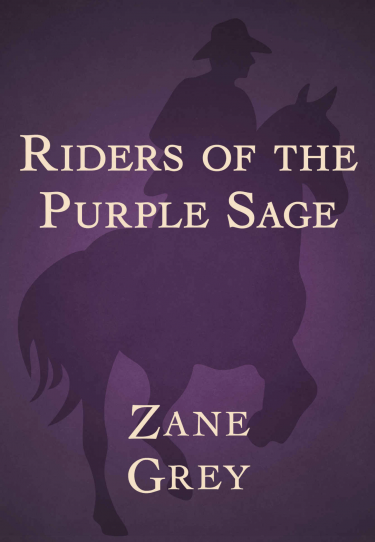REVIEW: Riders of the Purple Sage is a pioneering ★★★★☆ book
 I know I’m a good writer and author. But then I read something masterful by Laura Hillenbrand, David Foster Wallace, Norman Maclean, Bill Bryson, Mark Twain, Gay Talese, Alexander Dumas, Leo Tolstoy, or H. G. Bissinger and I begin to doubt myself.
I know I’m a good writer and author. But then I read something masterful by Laura Hillenbrand, David Foster Wallace, Norman Maclean, Bill Bryson, Mark Twain, Gay Talese, Alexander Dumas, Leo Tolstoy, or H. G. Bissinger and I begin to doubt myself.
After finishing Riders of the Purple Sage this week, I would add Zane Grey to that honorable list, especially since he was a dentist by trade, a semi-professional baseball player, and only wrote his popular adventure novels on the side!
But not only is Grey a great writer, he was also a pioneer. In fact, Riders invented the Western genre of storytelling when it was first published in 1912. Gun fights, southwestern backdrops, life and death on the American frontier.
But don’t let that genre or any misconceptions of it deter you. Riders is really two love stories in one, starring both a heroine and two heroes. It’s fantastically descriptive and emotionally engaged. I only dock it one star because there were a few times where Grey’s prose goes confusingly off trail, which forced me to re-read and decipher some paragraphs for clarity.
Nevertheless, it is a wonderful read. ★★★★☆
These were my favorite passages:
- “For years I’ve seen a storm clouding over her and the village of Cottonwoods,” muttered Venters, as he strode on. “Soon it’ll burst. I don’t like the prospects.
- These were not beautiful cedars. They were gnarled, twisted into weird contortions, as if growth were torture. Theirs had been a bitter fight, and Venters felt a strange sympathy for them. This country was hard on trees—and men.
- How many years had passed since the cliff-dwellers gazed out across the beautiful valley as he was gazing now? How long had it been since women ground grain in those polished holes? What time had rolled by since men of an unknown race lived, loved, fought, and died there? Had an enemy destroyed them? Had disease destroyed them, or only that greatest destroyer—time?
- “I winged him—put a bullet through his arm as he was pullin’ at his gun. An’ he dropped the gun there, an’ a little blood. I told him he’d introduced himself sufficient, an’ to please move out of my vicinity. An’ he went.”
- “The blindness I mean is blindness that keeps you from seein’ the truth. I’ve known many good Mormons. But some are blacker than hell. You won’t see that even when you know it. Else, why all this blind passion to save the life of that—that man.”
- “Your churchmen carry guns. Tull has killed a man an’ drawed on others. Your Bishop has shot a half dozen men, an’ to-day he’d have shot me if he’d been quick enough on the draw. Could I walk or ride down into Cottonwoods without my guns? This is a wild time, Jane Withersteen, this year of our Lord eighteen seventy-one.”
- A woman lay in his arms! And he held her closer. He who had been alone in the sad, silent watches of the night was not now and never must be again alone. He who had yearned for the touch of a hand felt the long tremble and the heart-beat of a woman. By what strange chance had she come to love him! By what change—by what marvel had she grown into a treasure!
- “Fay (a toddler) has taken you’re pretendin’ to—to care for me for the thing it looks on the face. An’ her little formin’ mind asks questions. An’ the answers she gets are different from the looks of things. So she’ll grow up gradually takin’ on that falseness, an’ be like the rest of the women, an’ men, too. An’ the truth of this falseness to life is proved by your appearin’ to love me when you don’t. Things aren’t what they seem.”
